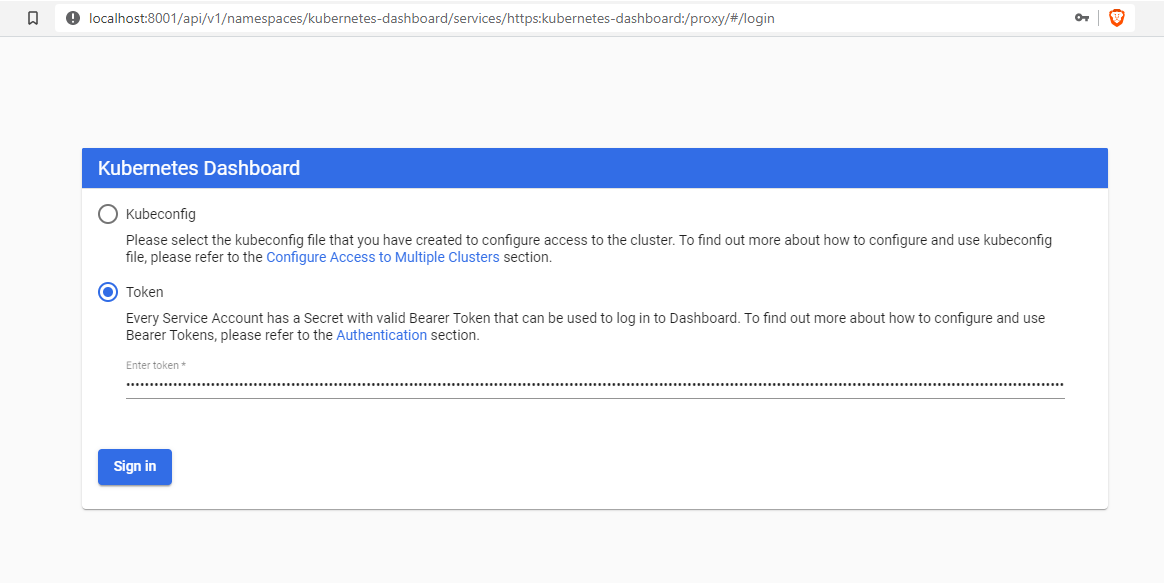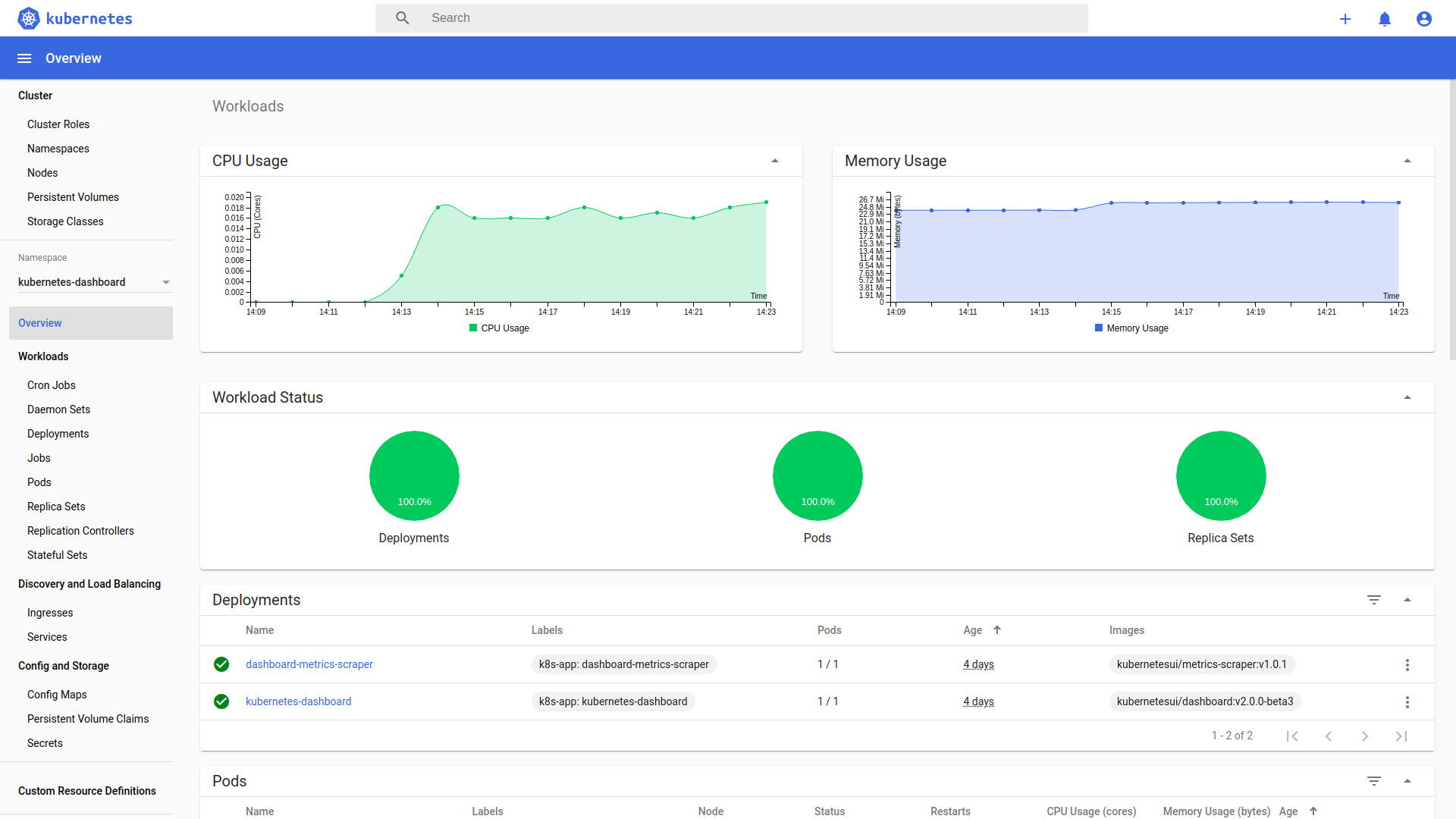Using:
- Virtualbox
- Vagrant
Vagrant and Virtualbox installed.
- Virtualbox 6.1
- Vagrant 2.2.7
Sorry for guys working in ESN company providing 1vCPU and 4go RAM, you will need more 😁
- At least 4vCPU
- At least 8go RAM
You will use this template:
- K8S Cluster You can modify if needed servers settings:
- servers.json
cd vagrant
vagrant up
- SSH connexion to control machine
cd vagrant
vagrant ssh k8s-master
- Check nodes
[vagrant@k8s-master ~]$ kubectl get nodes
NAME STATUS ROLES AGE VERSION
k8s-master Ready master 66m v1.17.2
k8s-node-1 Ready <none> 61m v1.17.2
k8s-node-2 Ready <none> 55m v1.17.2- Check that all kube-system pods are running (coredns, calico, kube-proxy...)
[vagrant@k8s-master ~]$ kubectl get pods -n kube-system
NAME READY STATUS RESTARTS AGE
calico-kube-controllers-5b644bc49c-nhjmn 1/1 Running 0 52m
calico-node-kwkct 1/1 Running 0 52m
calico-node-swmgx 1/1 Running 1 35m
coredns-6955765f44-g47wz 1/1 Running 0 52m
coredns-6955765f44-sjd7t 1/1 Running 0 52m
etcd-k8s-master 1/1 Running 0 53m
kube-apiserver-k8s-master 1/1 Running 0 53m
kube-controller-manager-k8s-master 1/1 Running 0 53m
kube-proxy-95wlx 1/1 Running 1 35m
kube-proxy-hnxsq 1/1 Running 0 52m
kube-scheduler-k8s-master 1/1 Running 0 53mIf you want to use and test Ingress resources,
- Apply an example with a deployment, a service, and an ingress.
[vagrant@k8s-master ~]$ kubectl apply -f https://raw.githubusercontent.com/ardole/k8s-cluster/master/demo/sample.yaml
service/my-example created
deployment.apps/example-deployment created
ingress.extensions/my-ingress created- Get ingress host and ip.
[vagrant@k8s-master ~]$ kubectl get ing
NAME HOSTS ADDRESS PORTS AGE
my-ingress mywebserver 10.100.71.58 80 103m- Add it at the bottom of /etc/hosts
[vagrant@k8s-master ~]$ vi /etc/hosts
[vagrant@k8s-master ~]$ cat /etc/hosts
127.0.0.1 localhost
10.100.71.58 mywebserver
192.168.50.10 k8s-master
192.168.50.11 k8s-node-1
192.168.50.12 k8s-node-2- Enjoy
[vagrant@k8s-master ~]$ curl https://mywebserver
Hello, world!
Version: 2.0.0
Hostname: example-deployment-68747f8875-wnnxs
[vagrant@k8s-master ~]$ curl https://mywebserver
Hello, world!
Version: 2.0.0
Hostname: example-deployment-68747f8875-fssfk
[vagrant@k8s-master ~]$ curl https://mywebserver
Hello, world!
Version: 2.0.0
Hostname: example-deployment-68747f8875-jkxlgIn order to setup the dashboard you need:
- Get the token for user-admin (because you will access the dashboard outside from the cluster, from your host)
[vagrant@k8s-master ~]$ kubectl -n kubernetes-dashboard describe secret $(kubectl -n kubernetes-dashboard get secret | grep admin-user | awk '{print $1}')
...
...
Data
====
ca.crt: 1025 bytes
namespace: 7 bytes
token: eyJhbGciOiJSUzI1NiIsImtpZCI6IlNkUFVsZjZrbWtYdzVkSG1qVldFVjFteTVXcnduRTU2UHNSTXVZLUFiNjgifQ.eyJpc3MiOiJrdWJlcm5ldGVzL3NlcnZpY2VhY2NvdW50Iiwia3ViZXJuZXRlcy5pby9zZXJ2aWNlYWNjb3VudC9uYW1lc3BhY2UiOiJkZWZhdWx0Iiwia3ViZXJuZXRlcy5pby9zZXJ2aWNlYWNjb3VudC9zZWNyZXQubmFtZSI6ImRhc2hib2FyZC1hZG1pbi1zYS10b2tlbi1oNzc0aCIsImt1YmVybmV0ZXMuaW8vc2VydmljZWFjY291bnQvc2VydmljZS1hY2NvdW50Lm5hbWUiOiJkYXNoYm9hcmQtYWRtaW4tc2EiLCJrdWJlcm5ldGVzLmlvL3NlcnZpY2VhY2NvdW50L3NlcnZpY2UtYWNjb3VudC51aWQiOiI0YWY5ZTdkYy01ODQ2LTQ1MGEtOWRhMi1jNGFhYjBmMzBmZjIiLCJzdWIiOiJzeXN0ZW06c2VydmljZWFjY291bnQ6ZGVmYXVsdDpkYXNoYm9hcmQtYWRtaW4tc2EifQ.VD83QLmFhEKWfwf26O97AruDCFfj0w4cbdZ4NgSYoe_VUcsxqNYUjOyrvDcR_T1f2F3KfzbrV5j2uGssVD-LDsiqYj_O3WWDblVDG17bdN59f4CzECKPlC-RbHvsn5EX9Fru7t6b2O_Tln_Vcz-83pcdrZOI3qEzJ8NLoPQuL1U3pJPbpGfaZpNCiT0OZwZZdLz5A4e_BpkIOZG5oQdvPFufJlb88gsexmnmyFyht7u7SzoJlDq2qcX5RloJw0eUFBhYCKeZMyT2O5RBoCjHFdDBxixn2ZuWUujCNsrLD4CedoKEAEN4pMBr2wsJDO-7EM3KKyAf92h10ICNy6YRmg-
Copy the token from your console
-
Start dashboard proxy, don't forget --address=0.0.0.0 option.
[vagrant@k8s-master ~]$ kubectl proxy --address=0.0.0.0
Starting to serve on [::]:8001-
Connect from your host to this address: https://localhost:8081/api/v1/namespaces/kubernetes-dashboard/services/https:kubernetes-dashboard:/proxy/
-
Past the token
- And click on Sign In ! Enjoy
- Control machine is k8s-master
- Docker is installed, with systemd
- CNI used is Calico
- Nginx Ingress
- A bare metal load-balancer : MetalLB
Some difficulties with Flannel and Virtualbox. Calico works well.
Kubernetes does not offer an implementation of network load-balancers (Services of type LoadBalancer) for bare metal clusters. If you’re not running on a supported IaaS platform (GCP, AWS, Azure…), LoadBalancers will remain in the “pending” state indefinitely when created.
[root@localhost temp]# kubectl get services
NAME TYPE CLUSTER-IP EXTERNAL-IP PORT(S) AGE
my-nginx LoadBalancer 10.111.43.88 <pending> 80:31730/TCP 22mWith MetalLB, it works ! https://metallb.universe.tf/
Range IPs for MetalLB is configured 192.168.50.240-192.168.50.250. See vagrant/install-k8s-master.sh

